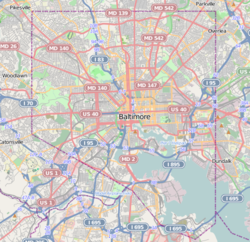Lovely Lane Chapel
|
Lovely Lane United Methodist Church
|
|

First Methodist Episcopal Church (Lovely Lane United Methodist Church), 1895.
|
|
| Location | 2200 St. Paul St., Baltimore, Maryland |
|---|---|
| Coordinates | 39°18′52″N 76°36′57″W / 39.31444°N 76.61583°WCoordinates: 39°18′52″N 76°36′57″W / 39.31444°N 76.61583°W |
| Area | 1 acre (0.40 ha) |
| Built | 1884 |
| Architect | White, Stanford |
| Architectural style | Romanesque |
| NRHP reference # | 73002189 |
| Added to NRHP | May 25, 1973 |
Lovely Lane United Methodist Church, formerly known as First Methodist Episcopal Church, and earlier founded as Lovely Lane Chapel is a historic United Methodist church located at Baltimore, Maryland, United States.
The building on St. Paul Street and 22nd Streets in the Charles Village (then originally named "Peabody Heights") neighborhood in the northern area of the City, was designed by renowned New York City architect Stanford White, (1853–1906) in the Romanesque Revival style, and completed in 1884, as the "Centennial Monument of American Methodism". It is patterned after the early churches and basilicas in Ravenna, Italy. The exterior is constructed of a gray ashlar granite with limited ornamentation. It features a square bell tower patterned after the campanile of the 12th century church of Santa Maria, Abbey of Pomposa, near Ravenna. The pulpit is a reproduction of the one at St. Apollinaris, in Ravenna.
Locally influential architect Charles L. Carson was supervising architect for the McKim, Mead & White firm from New York City during construction of the church. Lovely Lane Methodist Church was listed on the National Register of Historic Places in 1973.
The congregation is known as the "Mother Church of American Methodism." The original Lovely Lane Chapel or Meeting House was the scene of the December 1784 "Christmas Conference", at which the Methodist Episcopal Church in the United States was founded and Francis Asbury and Thomas Coke were ordained as its first bishops.
...
Wikipedia



